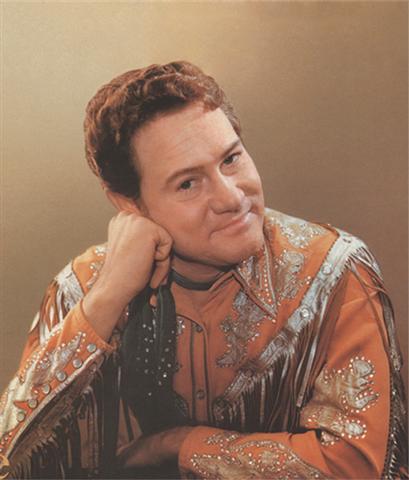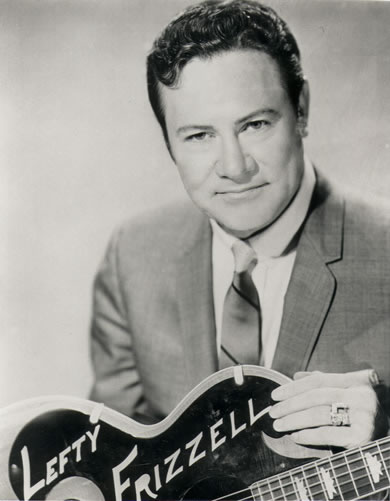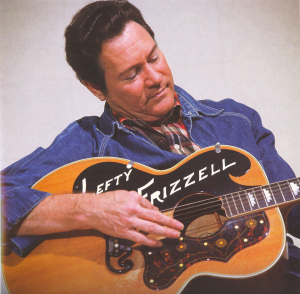<Back to Index>
- Singer and Songwriter William Orville "Lefty" Frizzell, 1928
PAGE SPONSOR



William Orville "Lefty" Frizzell (March 31, 1928 - July 19, 1975) was an American country music singer and songwriter of the 1950s, and a proponent of honky tonk music. His relaxed style of singing was an influence on later stars Merle Haggard, Willie Nelson, Roy Orbison, George Jones and John Fogerty. He is a member of the Country Music Hall of Fame.
Frizzell was born in Corsicana, Texas, but shortly after his birth he moved with his family to El Dorado in southern Arkansas, where the Frizzells remained until the early 1940s. Frizzell began playing the guitar as a young boy. By age 12, he was appearing regularly on a children's show at local radio station KELD-AM. The family returned to Texas when Frizzell was still a teenager, his music career receiving a significant boost when he won a talent contest in Dallas.
Called Sonny by his family, Frizzell got the nickname Lefty at age 14 after a schoolyard scrap, although his record company falsely suggested he had won a Golden Gloves boxing match.
In his late teens, Frizzell was performing at fairgrounds and other venues, developing a unique, soulful voice. Like his father, he worked in the oilfields, but his growing popularity as a singer soon provided regular work on the honky tonk nightclub circuit. At the age of 19, he had a half hour show on a small Texas radio station, getting a major break when record producer Don Law heard him sing live at the Club Ace of Clubs in Big Spring, Texas. Signed to Columbia Records, he immediately had a string of hits that broke into country music's top ten; several of them reached number one.
In 1950, Frizzell was invited to perform at the Grand Ole Opry; the following year he appeared on Louisiana Hayride in Shreveport, Louisiana, and then he and close friend "Cowboy" Ralph Spicer began touring with country music's biggest star of the era, Hank Williams. Handbills of the time referred to them as "Kings of the Honky Tonks." A prolific songwriter, Frizzell had four songs in the country top ten at the same time in 1951 - a feat that would not be repeated on any chart until The Beatles had five songs on the pop chart in 1964.
In 1952, while speeding through Minden, Frizzell crashed his Cadillac into the Elm Street residence of R. Harmon Drew, Sr., the municipal judge and later a member of the Louisiana House of Representatives.
By the end of the 1950s, rock and roll was dominating the American music scene, and although no one would mistake Frizzell's music for anything but country, his 1959 hit, "Long Black Veil", gained wide acceptance with a variety of music fans and was the first recording of this "standard." In 1964, Frizzell recorded "Saginaw, Michigan", which took the top spot on the country music charts and broke into the pop charts as well (No. 85 pop, Joel Whitburn's Top Country Singles). The song earned him a Grammy Award nomination.
In the early 1970s, Frizzell changed record labels and moved to Bakersfield, California, where he recorded several more country music hits and became the first country singer to perform at the Hollywood Bowl. Alcoholism by then, however, was a problem: mood swings and irrational anger became a trademark, and his constant failure to meet recording commitments strained his relationship with his recording company.
In 1972, Frizzell was inducted into the Nashville Songwriters Hall of Fame, and his song "If You've Got the Money I've Got the Time" earned him a Grammy Hall of Fame Award. Success and money only added to Frizzell's alcohol addiction, and on July 19, 1975, at age 47 he died after a massive stroke. He was buried at Forest Lawn Memorial Gardens in Goodlettsville, Tennessee. In October 1982, Frizzell was posthumously inducted into the Country Music Hall of Fame.
Frizzell's signature guitar was a Paul Bigsby customized 1949 Gibson J-200 (Model SJ-200). Originally built by the Gibson Guitar Company, it was retrofitted in early 1951 with a custom neck and pickguard by guitar maker and innovator Paul Bigsby. In a 2003 interview Merle Haggard recalled, "When I was a teenager, Lefty got me onstage [at the Rainbow Garden in Bakersfield, California] and handed me that guitar. That is the first guitar I played on a professional stage." For many years it had been on loan to and displayed at the Country Music Hall of Fame in Nashville, Tennessee. In January 2005 it was returned to the Frizzell family.
Frizzell's style of singing influenced a great many singers, particularly Merle Haggard, Willie Nelson, Keith Whitley and Dwight Yoakam. In addition, he was widely recognized for his songwriting talents. In the foreword to a biography of Frizzell by his younger brother David Frizzell, Merle Haggard said "The impact Lefty had on country music is not even measurable. ... No one could handle a song like Lefty. He would hold on to each word until he finally decided to drop it and pick up the next one. Most of us learned to sing listening to him."
George Strait recorded a Sanger D. Shafer song called "Lefty's Gone" on the album Something Special. In addition, Willie Nelson's 1977 album, To Lefty From Willie was a tribute to Frizzell and consisted entirely of cover versions of Frizzell songs. Frizzell was inducted into the Country Music Hall of Fame in 1982 and has a star on the Hollywood Walk of Fame. He is also in the Rockabilly Hall of Fame. Frizzell ranked number 31 on CMT's 2003 40 Greatest Men of Country Music.
Fellow Texan Roy Orbison was a devout fan of Frizzell's sound, and in 1988, as a part of the Traveling Wilburys, he chose the name "Lefty Wilbury" to honor his musical hero.
His younger brother, David Frizzell, is also a country
singer. His biggest hits were 1982's "I'm Gonna Hire a Wino (To Decorate
Our Home)" and "You're the Reason God Made
Oklahoma", a 1981 duet with Shelly West. The youngest
brother, Allen Frizzell followed in his older brothers'
footsteps in the country field. He opened for Dottie West.
He was also married to Shelly West, daughter of Dottie
West. Allen also played with Keith Whitley.
In 2006, J.D. Crowe and The New South released the album Lefty's Old Guitar. The song "Lefty's Old Guitar" was written about his custom Gibson J-200.